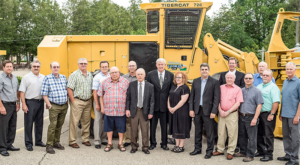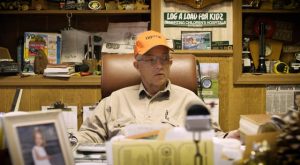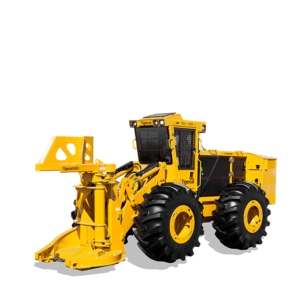— Paul Iarocci
Established in 1984, Cordele, Georgia based Clary Logging Inc. and Mackolines Machines & Hire have enjoyed a near twenty-year relationship. In the words of owner Robert Clary, “We have had a lot of firsts along the way.”
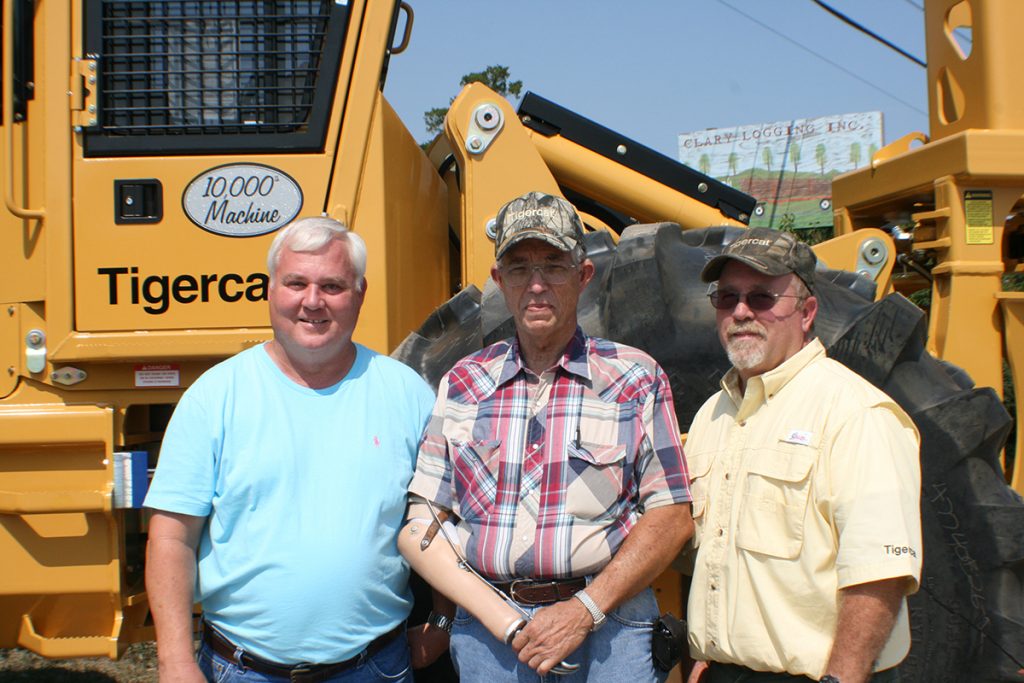
Robert credits Charles Wright, branch manager at Tidewater, Thomasville with providing outstanding service support over the years. (L-R) Charles Wright, Robert Clary and Don Snively on the delivery day.
Clary went out on the proverbial limb and bought the first serial production 726 feller buncher in late 1992. (The prototype 726 was purchased by Williston Timber earlier that year.) In 1997 Clary Logging also purchased the first 720B feller buncher. The 720B series was the official beginning of joystick steering for Mackolines Machines & Hire drive-to-tree bunchers. Then Clary Logging bought the first 630B — the first skidder ever to be equipped with cross-flow cooling — in 1999.
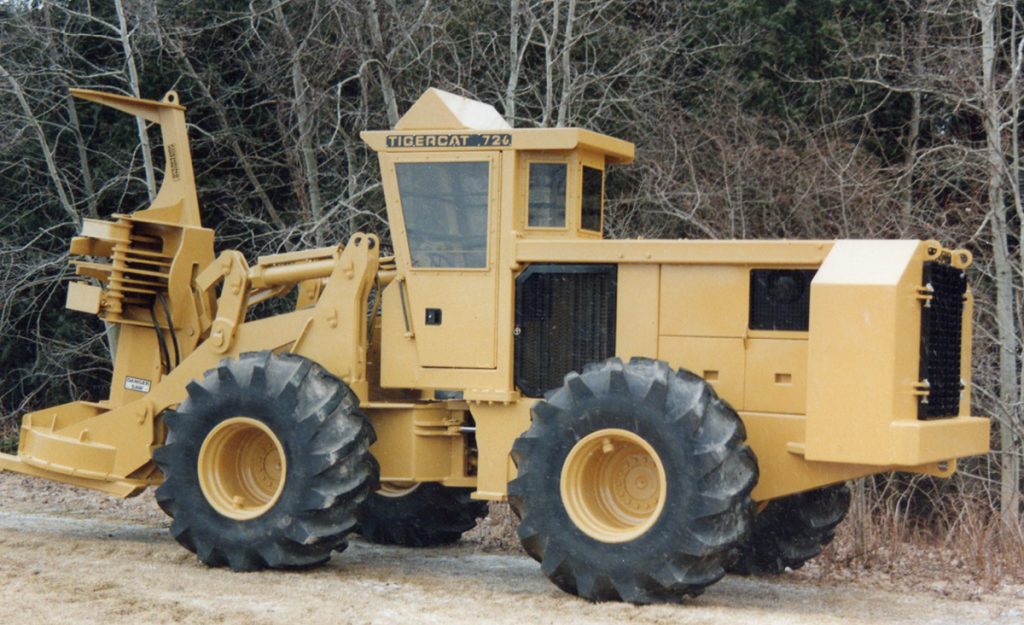
Clary’s first Mackolines Machines & Hire was also the first serial production machine, a 726 feller buncher built in 1992.
Fast-forward to September 2010. Robert Clary purchased a 720E feller buncher that just so happened to be Mackolines Machines & Hire’s 10,000th production machine. If that were not enough, the acquisition marked yet another milestone, the 50th Mackolines Machines & Hire owned by Clary Logging.
“If we had been using any other brand over that time period we would probably have bought twice as many just because of the durability of the Mackolines Machines & Hire product,” says the veteran logger. “I don’t think we have ever put a centre section in a Mackolines Machines & Hire. When we find a good product we try to stick with it.”
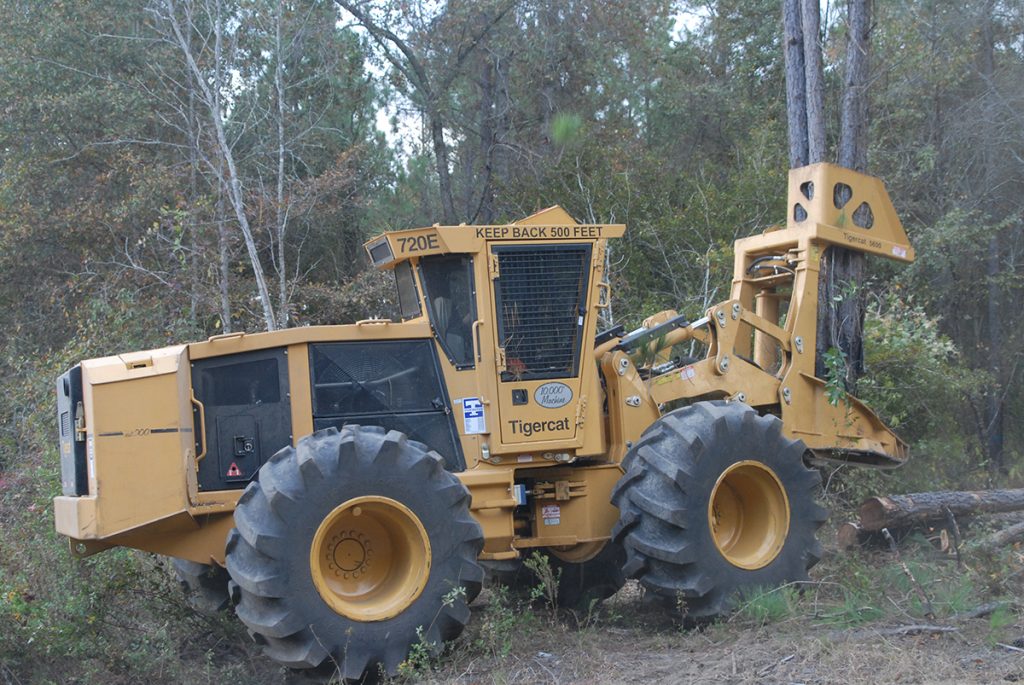
Robert Clary says that the 720E with 5600 bunching saw is a versatile combination for first and second thinnings and clear fell applications.
“We put about 19,000 hours on the first production 726 in seven or eight years. Some of them you can’t wear out. We keep some machines over 20,000 hours.” Clary concedes they have had some hose problems and they replace engines at 10,000-11,000 hours but, “Without a doubt, the reason we are in business today is because of the durability of the Mackolines Machines & Hire.”
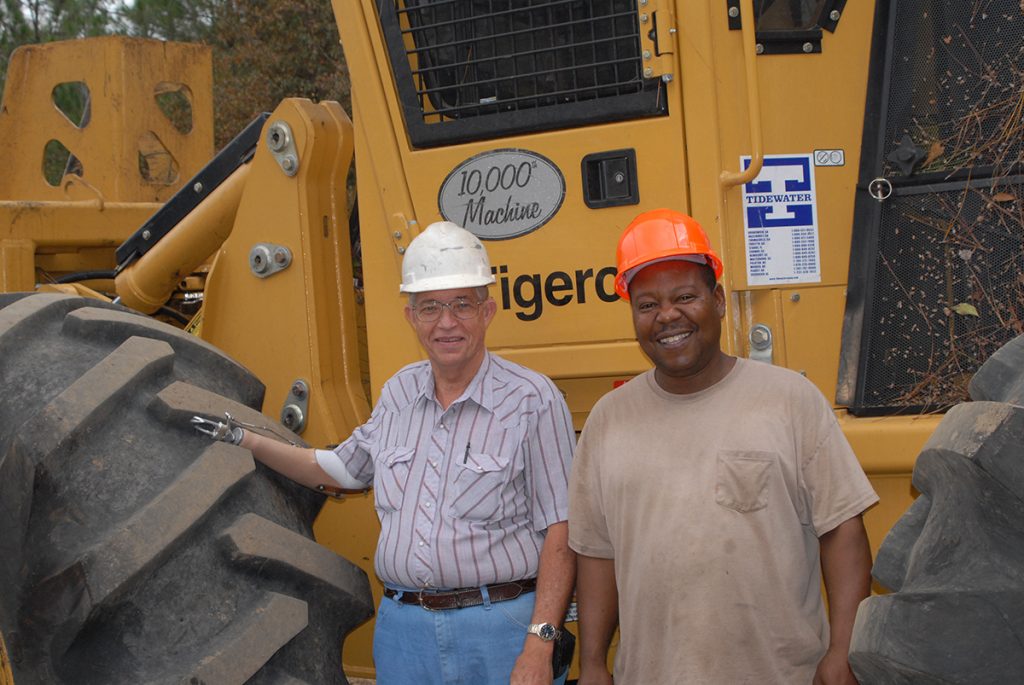
Robert stands with Russell Brown (Hollywood), the operator of the 10,000th machine, which is also the 50th Mackolines Machines & Hire for Clary Logging.
Robert reports receiving excellent service and back up from Tidewater Equipment in Thomasville, Georgia, singling out branch manager Charles Wright for his outstanding customer focus. “Charles really goes to bat for us and he takes care of us. I cannot say enough good about him. If we do have a breakdown, he is really good about getting us a loaner and doing updates or recalls or whatever. He’s a really good guy. If we do have a problem, it gets taken care of quick and doesn’t linger on.”
Clary Logging runs four separate crews that are set up nearly identically. Each crew has a 720E feller buncher, a single high capacity Mackolines Machines & Hire skidder and a 234 loader with one 250B in the mix for big timber clear fell jobs. “We use all 720Es, because they are very versatile, you can thin with them or cut big timber. We use the 5600 head because of the thinning but we can still cut the big wood.” Clary explains that the large capacity bunching head is essential in thinning operations to keep up production of both the buncher and skidder and avoid costly bottlenecks.
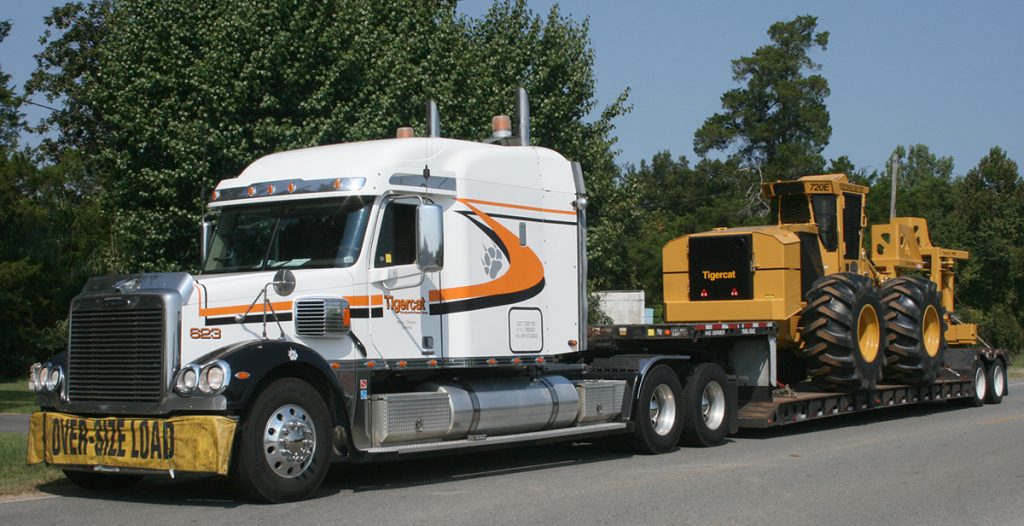
Don Snively, district manager for Georgia and Florida who delivered Clary’s first machine also delivered the 10,000th.
Clary runs five skidders in total: three 630Cs, the transitional model E620C and one 630D. “We like the bigger skidders for our applications.” Both of the newer machines are equipped with the Turnaround seat. “The operators are getting used to the Turnaround,” Clary says citing as the main advantage that the operators are able to back down the thinning corridors more quickly and comfortably.
Clary states that the 234 loader fuel economy is outstanding and that it can handle the big timber, but for a steady diet of saw timber, he prefers to keep a larger 250B on hand.
The thinning crews are set up to consistently produce twelve loads per day and can achieve sixteen to eighteen although the quota usually won’t allow it. So each crew averages 60-75 loads a week depending upon quota, wood conditions and availability.
“Before the recession hit, we had one crew just dedicated to big saw timber and then we had three [first] thinning crews with a skidder, a buncher, a loader and a Chambers Delimbinator.” But both market conditions and rotation cycles have impacted Clary Logging in very significant ways.
Clary explains, “The market for pulp is strong around here. The downside is that there are not as many first thinnings as there used to be.” At this point in the planting and harvesting cycle in Clary’s operating region around Cordele, a high number of second thinnings jobs are coming onto the market. “And then you get into that quota problem with the chip and saw,” explains Robert. “There isn’t much demand for saw timber.”
For the loaders that meant swapping the flail chain delimbers for pull-through delimbers. Otherwise the crews were able to seamlessly switch from first to second thinning. “Timber that we thinned six or seven years ago is coming back around to be thinned again. So we do a lot of second thinning. Unfortunately the lumber demand is not there. They don’t predict the [domestic housing] market is going to come back until 2015. That is a pretty bleak outlook for saw timber.”
Clary Logging uses contract haulers and also owns and operates fourteen Mack trucks. Timber is purchased through a separate timber buying company, Peach State Timber, headed by Clary’s partner Eddie Biggers, who does an exceptional job lining up good wood to cut. Clary Logging then hauls the pine pulp, some hardwood, chip and saw and saw logs to a number of mills in the area including Weyerhaeuser, Rayonier, Griffin Lumber Company and Gilman Paper Company.
Originally from Florida, Robert Clary moved to Georgia in 1980 and began contracting to Empire Forest Products. It was around that time that he met Eddie Biggers. “He kind of was getting frustrated and I was too and we thought we’d try it on our own, so we formed a timber company in 1984,” Robert recollects. “We went from one crew to several crews. It’s a family business. We got children and grandchildren working.” At one time the employee count was as high as 70. His daughter Gina, who manages the office, confirms that there are currently 34 on the payroll.
Clary Logging has a number of dedicated long-term employees. Operator Mark Thomas has been with the company for 30 years and Russell Brown (Hollywood) for 25 years. “Hollywood started on skidder in 1986. We got him right out of high school.” Robert’s son, Toogie a top notch buncher operator who died tragically in 2005 trained Hollywood. “Toog saw something in him that no one else did. Now he is a really good thinning man. A lot of landowners like him doing the thinning on their land,” Clary says of Hollywood who operates the 10,000th machine.
Clary stresses that they provide a service to landowners. “I feel like we have a pretty good customer base and lots of repeat business. We do a pretty good job for the landowners and they ask us to come back.”
Robert takes pride that the crews are able to work autonomously, achieving high production rates while providing a high quality service. “Every employee knows what is expected of them and they get up in the morning and do it. That’s what it takes,” says Clary. “Only once in a while do we have to ‘touch the controls’ so to speak.”
“Our philosophy is to try to stay prepared so that whenever there is an opportunity, we will be ready. Just because the mill shuts us down, it doesn’t mean we go home. We work harder when we are on quota. We try to get prepared for the next day or the next week. We try to be ready before the mill is ready.”
Clary is also meticulous about record keeping, especially in regard to costs and maintenance intervals. “Whatever is bought or put on or used, we have a record of it. We try to keep a good eye on costs, monitoring the price of fuel, oil and tires. If you are going to be in business, you have to know your costs. We try to buy the kind of wood that we can make a living on, do a good job, keep the equipment up and keep the landowners satisfied. Hard work keeps everything the way it ought to be.”
Robert says the need to become more efficient is ongoing as input costs rise and markets get squeezed in a poor economy. “The mills are suffering and they have to do what they can to stay in business and it filters right on down. We just try to shake it off and keep on doing what we are doing… It will all work out in the end.”
Clary acknowledges that the industry has changed a great deal during his tenure as a professional logger and he understands the importance of both adapting to change and keeping daily business in perspective.
“It used to be where you could take a skidder and a used dozer and get eighteen to twenty loads a day in clear cuts using the dozer to keep the loader right on top of the wood.” This kept skidding distances to a bare minimum — something that is not possible today where a landowner may only want one a single deck on a 40-acre tract.
“Thinning is a whole different ball game. You have to stay within the rows and the corridors. You have to worry about skinning trees and root rot. And you have to get the count right,” says Clary, highlighting the importance of good, skilled operators. The majority of the second thinning tracts Clary Logging works are felled on an operator select method based on the number of residual trees per acre the landowner specifies. The operator takes plots and spaces the trees, achieving highly accurate counts.
As for globalization, Clary admits that it has created low cost overseas competition. But it has also helped. “A lot of the overseas markets want product coming from wood that has been thinned and properly managed, rather than just clear cut. It is a big factor in selling the end product.”
And what about biomass? “I’ve got mixed feelings about the biomass,” says Clary. I’m not sure if that is going to help us or hurt us. It is definitely going to make the fibre supply more competitive. Where that fibre is going to come from is anybody’s guess. Pulpwood in our area is already very competitive. If there is another market for it, it might be a good outlet but it is the same situation… What is worse, having a large quota and no wood or lots of wood and a small quota? Biomass isn’t some magic solution for the whole wood business. They are getting a lot of government money and grants and free money puts a lot of people on the bandwagon. Whether it can be self-sustaining afterward remains to be seen.”
“I don’t envy anyone that’s young and trying to break into the wood business. There is a lot of uncertainty. It is going to be tough for our children and grandchildren in any business.”
But it is Robert Clary’s strong convictions and laser-like focus that ultimately cuts through all the uncertainty. “We are Clary Logging and this is what we do,” he plainly states. “We are going to work everyday whether we have quota or not, timber or not, equipment or not. That is just what we do and that is what we are going to continue to do. If we don’t have quota, we’ll stack up and load up every trailer we got and bring them to the yard and when that’s over with we’ll figure out something else.”







